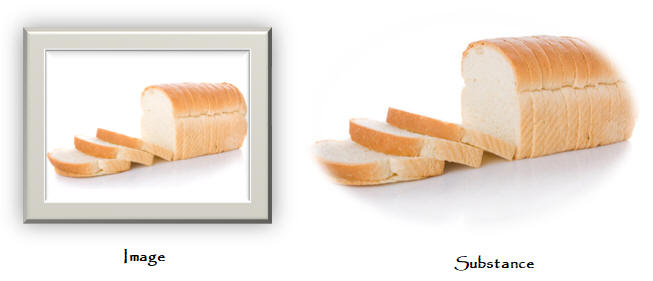In other words, the excerpt is referring to
the New Testament - which, as "image", had replaced the "shadow"
that is the Old Testament!
We have to wonder: what was the reason the
Watchtower Society chose to insert this falsification? Was it
simply a case of sloppiness? Was it perhaps an attempt to demote
the word "substance", which is used by Christians in Theology?
Was it so that the verse will not imply that the New
Testament is only an "image" of the Things to
come? Or maybe it was to avoid acknowledging that the New
Testament era is the ...era of "images" (icons ?)
A Watchtower follower might ask us: "Come
on now! One tiny word - even if it's wrongly translated - what
problem could it possibly create? What could possibly
be altered, on account of something so small?"
And yet, within that tiny word is hidden an
extremely serious dimension of the Christian Gospel. It is in
fact the one dimension of the New Testament itself, because :
THE SUBSTANCE OF THINGS IS ONE THING, AND THE IMAGE THEREOF IS
ANOTHER. THE "SUBSTANCE" OF THINGS IMPLIES THOSE ACTUAL
THINGS. THE TERM "IMAGE" IS SOMETHING ENTIRELY DIFFERENT - it
implies something that is deficient.
This specific verse is the one that clarifies
in what sense
the Old Testament differs from the New Testament, and also
regarding
the "good Things to come". It clarifies for us that: just as the
Old Testament -when compared to the New Testament- is deficient
(a "shadow", by comparison), likewise the New Testament -when compared to the Things to come-
is also comparatively deficient (an
"image", by comparison). However, an "image" is still far more superior to
a "shadow"...
With this falsification, the truth of the
Gospel is lost and perverted, and the New Testament is
presented as being the per se... substance of the Things to come.
Most probably the translators of the NWT did not realize this, for
the reason that they are not adequately familiar with the Greek
form of the language in the Gospel.
Otherwise, they would need to explain:
How is it possible for the
substance of the "Good Things" to
be mentioned in the New Testament, if they are
referred to in there as things
that are "to come"?
Based on the above, the Watchtower followers should not only be allowed
to venerate images (icons), but also to worship them, because, by
venerating images they would be venerating the
"substance" of God! Correct?!
(The reader who wishes to see the serious
extension of this verse - as regards the comprehension of the
Holy Bible's coherence and how this tiny word relates to the
basic truth that our God is revealed in the
New Testament
as "Father" - we would invite him to read a more
detailed
study relative to this verse.)
Not only are there discrepancies in the Greek
NWT (when the NKJV coincides correctly with
the original Greek text), but there are also discrepancies in
the English NWT translation in this same verse (where again the
NKJV coincides correctly with the original Greek text).
Here is the other "tiny" but equally
significant detail in this same verse:
Where the original Greek AND the NKJV
texts clearly state that the Law
can never make perfect those who strive to approach the good
things to come, the NWT has arbitrarily inserted in brackets a
word that does not exist in the original Greek text, nor in the
NKJV translation: it is the word [men]!!! This
arbitrary addition has enabled them to imply that
men - not the Law - "can
never make perfect those who approach" !!
To elaborate:
The form of the Greek verb
"δύναται"
- as used in the original text - pertains to a subject that
should be in the singular; and indeed it is: the subject
is the Law (ο Νόμος....δύναται).
If the verb
had pertained to something in the plural, then its Greek form
would have been "δύνανται"
and it would have to match a subject that is in the
plural. In this case, the subject (arbitrarily
inserted by the NWT) is the word "men"
(=plural)! What the NWT translators carelessly ignored
was that the form of the verb in the original Greek text did NOT
comply with a subject in the plural. As mentioned above, the
verb "δύναται" relates to a subject in
the singular: "the Law"...
Unlike the precision of Greek grammar, the
equivalent English verb "can" is the same in both the
singular and the plural, and as such, is easily utilized to
accommodate falsifications like the present NWT example.
English
Greek
I
can

